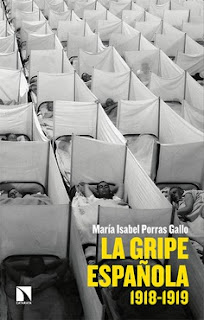Novedad bibliográfica: La gripe española: 1918-1919

Autora: María Isabel Porras Gallo La pandemia de gripe de 1918-1919 está considerada la crisis epidémica mundial más mortífera del siglo XX. Marcada por el influjo de la Gran Guerra (que movilizó mercancías, soldados y trabajadores por países como China, Estados Unidos, Francia o Sierra Leona), más de cien años después, investigadores y especialistas continúan preguntándose por su origen y las razones de su intensidad. Pese al injusto sobrenombre de “española” (a causa de la censura militar impuesta en los países beligerantes), esta enfermedad también hizo estragos en nuestro país, donde contó con hasta tres grandes brotes, que se ensañaron especialmente con la capital y sus alrededores. La experiencia de la pandemia transformó la sociedad en casi todos los órdenes y su impacto pervivió décadas y condicionó la respuesta a las siguientes pandemias, pero pasada la urgencia, parte de las reformas sanitarias y sociales propuestas para modernizar y mejorar el país se demoraron, otras s...